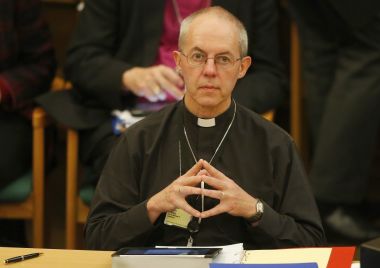Welby: ISIS needs theological and military response
The prospect of war with Syria raises "distinct theological and religious" issues, the archbishop of Canterbury said yesterday.

Justin Welby spoke in the House of Lords following David Cameron's statement imploring MPs to vote in favour of British air strikes against ISIS in Syria.
Cameron took the unusual step of personally responding to a report by the foreign affairs committee by delivering a statement to the House of Commons. Usually such a report would at most receive a letter from the Prime Minister.
But the report into extending British military activities to Syria was of particular importance and Cameron took the opportunity to make an impassioned plea for MPs to support air strikes in Syria. The British military is currently engaged in air strikes against ISIS in Iraq but not across the border in Syria, even though the so-called "caliphate" spans the two countries. Indeed ISIS' main stronghold of Raqqa is in northern Syria.
Welby, who sits in the House of Lords alongside 25 other bishops, thanked the "emphasis on a comprehensive approach" of both the Prime Minister's statement and the foreign affairs committee's report.
The emphasis on "the seriousness of military action but also of the integration of soft and hard power" was "very welcome," said Welby as he spoke of the importance of supporting "jobs, education, family and community life and stability, and community flourishing in the neighbouring countries."
As well as highlighting the long-term needs of local people, particularly the heavily persecuted Christian communities, Welby said the religious aspect in this conflict was unique.
"For the first time in almost 300 years, we're facing a conflict that has a distinct theological and religious element which we have not faced before," he told peers. "Recent studies demonstrate the theological basis of extremist groups behind jihadist thinking."
Welby finished his statement by urging the government to realise the theological aspect to the conflict and have an ideological as well as military response.
"Does the Government realise that in facing this conflict there must be an ideological response that is not only national in dealing with the threat of extremism here, but is global in challenging the doctrines that draw so many people to support ISIS internationally?" he said.
"What steps are they proposing to take to put together the conflict at the ideological and theological level, as well as at humanitarian and military?"











